unit+2+Ill+help+to+clean+up+the+city+parks+Section+A1(共53张PPT)
- 格式:ppt
- 大小:14.24 MB
- 文档页数:52
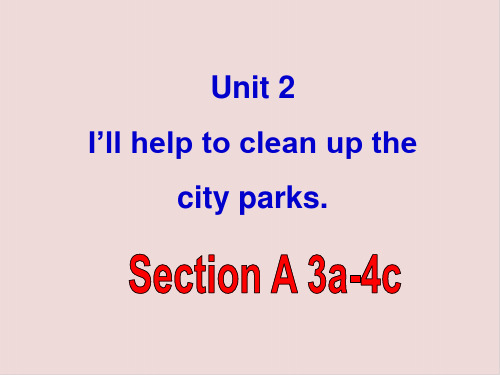
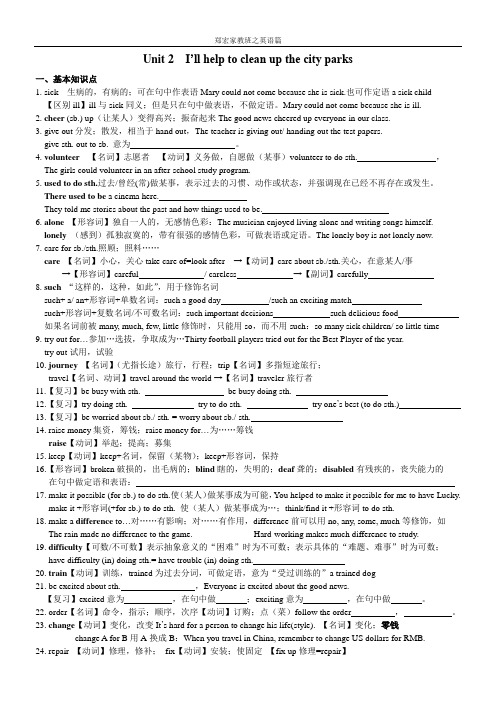
Unit 2 I’ll help to clean up the city parks一、基本知识点1. sick 生病的,有病的;可在句中作表语Mary could not come because she is sick.也可作定语a sick child【区别ill】ill与sick同义;但是只在句中做表语,不做定语。
Mary could not come because she is ill.2. cheer (sb.) up(让某人)变得高兴;振奋起来The good news cheered up everyone in our class.3. give out分发;散发,相当于hand out,The teacher is giving out/ handing out the test papers.give sth. out to sb. 意为。
4. volunteer【名词】志愿者【动词】义务做,自愿做(某事)volunteer to do sth. ,The girls could volunteer in an after-school study program.5. used to do sth.过去/曾经(常)做某事,表示过去的习惯、动作或状态,并强调现在已经不再存在或发生。
There used to be a cinema here.They told me stories about the past and how things used to be.6. alone【形容词】独自一人的,无感情色彩:The musician enjoyed living alone and writing songs himself. lonely(感到)孤独寂寞的,带有很强的感情色彩,可做表语或定语。
The lonely boy is not lonely now.7. care for sb./sth.照顾;照料……care【名词】小心,关心take care of=look after →【动词】care about sb./sth.关心,在意某人/事→【形容词】careful / careless →【副词】carefully8. such“这样的,这种,如此”,用于修饰名词such+ a/ an+形容词+单数名词:such a good day /such an exciting matchsuch+形容词+复数名词/不可数名词:such important decisions such delicious food如果名词前被many, much, few, little修饰时,只能用so,而不用such:so many sick children/ so little time9. try out for…参加…选拔,争取成为…Thirty football players tried out for the Best Player of the year.try out试用,试验10. journey【名词】(尤指长途)旅行,行程;trip【名词】多指短途旅行;travel【名词、动词】travel around the world →【名词】traveler旅行者11.【复习】be busy with sth. be busy doing sth.12.【复习】try doing sth. try to do sth. try one’s best (to do sth.)13.【复习】be worried about sb./ sth. = worry about sb./ sth.14. raise money集资,筹钱;raise money for…为……筹钱raise【动词】举起;提高;募集15. keep【动词】keep+名词,保留(某物);keep+形容词,保持16.【形容词】broken破损的,出毛病的;blind瞎的,失明的;deaf聋的;disabled有残疾的,丧失能力的在句中做定语和表语:17. make it possible (for sb.) to do sth.使(某人)做某事成为可能,You helped to make it possible for me to have Lucky.make it +形容词(+for sb.) to do sth. 使(某人)做某事成为…;think/find it +形容词to do sth.18. make a difference to…对……有影响;对……有作用,difference前可以用no, any, some, much等修饰,如The rain made no difference to the game. Hard-working makes much difference to study.19. difficulty【可数/不可数】表示抽象意义的“困难”时为不可数;表示具体的“难题、难事”时为可数;have difficulty (in) doing sth.= have trouble (in) doing sth.20. train【动词】训练,trained为过去分词,可做定语,意为“受过训练的”a trained dog21. be excited about sth. ,Everyone is excited about the good news.【复习】excited意为,在句中做;exciting意为,在句中做。



Unit 2 I ’ll help to clean up the city parks.一:单词1.打扫或清除干净___________2.欢呼;喝彩 v__________3.使变得高兴;振奋起来_____4.分发;散发___________5.义务做;自愿做v 自愿者n____6.想出;提出(主意、计划、回答等)___________7.推迟___________8.标志;信号 n___________9.通知、通告n注意到;意识到v 10.分发___________11.打电话给某人;征召___________ 12.曾经...;过去...___________ 13孤独的;寂寞的 adj__________ 14.照顾;非常喜欢__________15.几个;数个;一些pron_____ 16.强烈的;强壮的adj________ 17.感觉;感触 n________ 18.满足;满意 n_________19.高兴;愉快 n_________ 20.物主;主人 n_________21.参加...选拔;试用_______ 22.尤指长途旅行;行程 n______23.募集;征集 v________ 24.独自;单独 adv__________25.修理;修补 v__________ 26.修理;安装 v________27.修理;装饰_________ 28.赠送;捐赠_________29.(外貌或行为)像_____ 30.破损的;残缺的adj_____31.车轮;轮子 n_____ 32信;函n _____33.女士;小姐 n_____ 34.建起;设立_____35.丧失能力的;有残疾的adj 36。
影响;有作用_____37.瞎的;失明的adj_____ 38.聋的adj_____39.想象;设想 v_____ 40.困难;难题 n_____ 41.开;打开 v_____42.门 n_____ 43.拿;提;扛 v_____ 44.训练;培训 n_____ 45.仁慈;善良n_____ 46.聪明的;聪颖的adj_____ 47.理解;领会 v_____ 48.变化;改变 v n _____ 49.兴趣;关注 n 使感兴趣使关注v__________50.先生 n_____ 51夫人;女士 n_____二:短语1. Clean-Up Day 清洁日2. an old people’s home 养老院3. help out with sth. 帮助解决困难4. used to 曾经… … ;过去_5. care for 关心;照顾6. the look of joy 快乐的表情7. at the age of 在......岁时8clean up 打扫(或清除)干净9. cheer up (使)变得更高兴;振雀10. give out 分发;散发11. come up with 想出;提出12. make a plan 制订计划13. make some notices 做些公告牌14. try out 试用;试行15. work for 为…工作;为…. 效力16. put up 建造;举起;张贴17. hand out 分发;散发;发给18. call up 打电话;召集19. put off 推迟;延迟20. for example 比如;例如21. raise money 筹钱;募捐22. take after 与......相像;像23. give away 赠送;捐赠24. fix up 修理;修补;解决25. be similar to 与……相似26. set up 建立;设立27. disabled people 残疾人28. make a difference 影响;有作用29. be able to 能够30. after-school reading program课外阅读项目三:句型1. The boy could give out food at the food bank.这个男孩可以在食品救济站分发食物。

人教新版八年级下册Unit 2 I ’ll help to clean up the city parks.知识点精讲--Section BSection B1. I repaired it . 我把它修好了【解析】 repair v “修理;修复”1) repair的对象范围很广,从房屋、道路、机器到日常生活必需品,是使受到一定损失或失灵的东西恢复其形状或功能。
Who has repaired the broken leg of the table? 谁把桌子的断腿修好了?2) mend的意思是恢复某物原来的样子(包括用针、线来缝补),一般指较小之物。
This shirt is too old to mend. 这件衣服太旧不能补了。
3) fix用于需要重新“调”物体的结构,把松散的部件固定结实,将分离的物体各部分装配起来。
用于美国口语中,与repair无多大区别。
Can you fix the broken chair? 你能修理那把坏了的椅子吗?2. I take after my mother. 我长的像我妈妈。
【解析】(1)take after =be similar to在(外貌、性格等方面)与(父母)相像(v. +adv)【短语】take back 收回,接回 take down 写下 take off 脱下;起飞take up 占去(时间或空间)take care 小心take care of 照顾take place 发生 take out 拿出take away 拿走(2)look like 只指在外貌上与…..相像【短语】:look after 照顾 look up 向上看,查找look for 寻找 look out 小心( ①)—Do you ___after your mother or your father?— My father .We both have big eyes and black hair.A. look B. take C. run( )② The girl _____ the woman. Maybe she is her daughter. A. take care B. takes after C. takes off D. look after【2011山东青岛2】Tom ___ his father, because they both are cheerful and easygoing.A. looks likeB. takes afterC. doesnt’ take afterD. isn’t like3. I fixed it up. 我把它修理好了。

Unit 2 I’ll help to clean up the city park s.Section A 1 (1a-2d)一、教学目标:1. 语言知识目标:1) 能掌握以下单词: clean up, city, cheer, cheer up, give out, volunteer, notice, used to, lonely,能掌握以下句型:① You could help to clean up the city parks.② We should listen t o them and care for them.2) 能了解以下语法:情态动词could, should的用法;用should或could提出建议并对别人的建议作出评价。
如何表达主动提供帮助。
2. 情感态度价值观目标:在授课过程中渗透助人就是助己,助人收获快乐的情感目标,使学生在谈论如何为别人提供帮助的对话中能意识到尽己所能,帮助他人,乐于奉献是一种良好的品德,培养学生为他人着想,热爱公益事业,乐于助人的优良品质。
二、教学重难点1. 教学重点:1) 掌握这些短语动词的构成和用法:clean up, city, cheer, cheer up, give out, volunteer,notice, used to, lonely2) 学会提供帮助的基本句型:I’d like to work outside.I’ll help clean the city park.You could give out food at a food bank.2. 教学难点:学会提供帮助的基本句型三、教学过程Step 1 New words1. notice n. 公告牌;通告;布告e.g. Please read the list on the notice board. 请读公告板上的名单。
2. sign n.标志;信号e.g. Look around, we could see no sign of life.环顾四围,我们看不出一点生命的迹象。
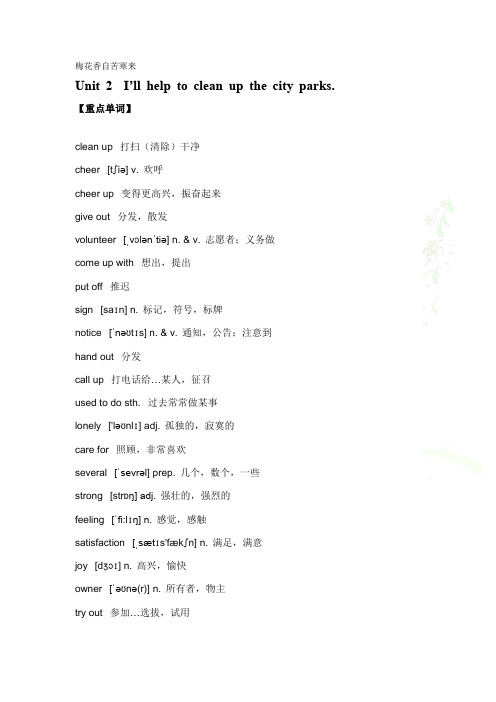
梅花香自苦寒来Unit 2 I’ll help to clean up the city parks.【重点单词】clean up 打扫(清除)干净cheer [tʃiə] v. 欢呼cheer up 变得更高兴,振奋起来give out 分发,散发volunteer [ˌvɔlənˈtiə] n. & v. 志愿者;义务做come up with 想出,提出put off 推迟sign [saɪn] n. 标记,符号,标牌notice [ˈnəʊtɪs] n. & v. 通知,公告;注意到hand out 分发call up 打电话给…某人,征召used to do sth. 过去常常做某事lonely ['ləʊnlɪ] adj. 孤独的,寂寞的care for 照顾,非常喜欢several [ˈsevrəl] prep. 几个,数个,一些strong [strɒŋ] adj. 强壮的,强烈的feeling [ˈfi:lɪŋ] n. 感觉,感触satisfaction [ˌsætɪs'fækʃn] n. 满足,满意joy [dʒɔɪ] n. 高兴,愉快owner [ˈəʊnə(r)] n. 所有者,物主try out 参加…选拔,试用journey ['dʒɜ:nɪ] n. (尤指长途)旅行,行程raise [reɪz] v. 抬起,举起,筹集,征集alone [əˈləun] adv. 独自地,孤独地repair [riˈpɛə] v. 修理,修补fix [fiks] v. 修理,安装fix up 修理,修补give away 赠送,捐赠take after (外貌或行为)像broken ['brəʊkən] adj. 破损的,残缺的wheel [wi:l] n. & v. 轮子,车轮;旋转letter [ˈletə] n. 信件,字母Miss [mɪs] n. 小姐set up 建立,设立disabled [disˈeibəld] adj. 有残疾的,丧失能力的make a difference 影响,有作用blind [blaɪnd] adj. 盲的,盲目的,失明的deaf [def] adj. 聋的imagine [ɪˈmædʒɪn] v. 想象,设想difficulty ['dɪfɪkəltɪ] n. 困难open [ˈəʊpən] v. 打开door [dɔ:] n. 门carry ['kærɪ] v. 携带,搬运train [treɪn] v. 训练,培养training [ˈtreɪnɪŋ] n. 训练,培训excited [ɪkˈsaɪtɪd] adj. 激动的,兴奋的kindness [ˈkaɪndnəs] n. 仁慈,善良,亲切,善意clever [ˈklevə] adj. 聪明的,机灵的understand [ˌʌndəˈstænd] v. 懂,理解change [tʃeɪndʒ] n. & v. 改变interest ['ɪntrəst] n. & v. 感兴趣;兴趣sir [sɜ:(r)] n. 先生madam ['mædəm] n. 夫人,女士【重点短语】1.Clean-Up Day 清洁日2. an old people’s home 养老院3. help out with sth. 帮助解决困难4. used to 过去常常......5. care for 关心;照顾6. the look of joy 快乐的表情7. at the age of 在......岁时8.clean up 打扫(或清除)干净9. cheer up (使)变得更高兴;振奋10. give out 分发;散发11. come up with 想出;提出12. make a plan 制订计划13. make some notices 做些公告牌14. try out 试用;试行15. work for 为…工作;为…. 效力16. put up 建造;举起;张贴17. hand out 分发;散发;发给18. call up 打电话;召集19. put off 推迟;延迟20. for example 比如;例如21. raise money 筹钱;募捐22. take after 与......相像;像23. give away 赠送;捐赠24. fix up 修理;修补;解决25. be similar to 与……相似26. set up 建立;设立27. disabled people 残疾人28. make a difference 影响;有作用29. be able to 能够30. after-school reading program 课外阅读项目【重点句型】1. The boy could give out food at the food bank. 这个男孩可以在食品救济站分发食物。
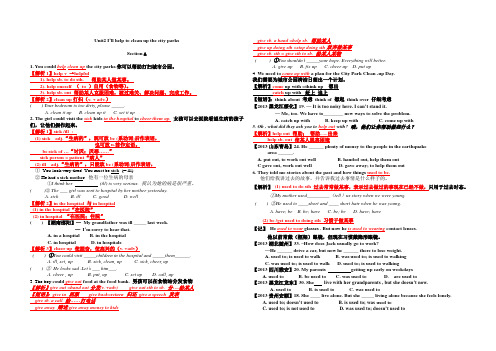
Unit2 I’ll help to clean up the city parksSection A1. You could help clean up the city parks.你可以帮助打扫城市公园。
【解析1】help v →helpful1). help sb. to do sth. 帮助某人做某事。
2). help oneself (to )自用(食物等)。
3). help sb. out 帮助某人克服困难,渡过难关、解决问题、完成工作。
【解析2】clean up打扫(v. + adv.)( ) Your bedroom is too dirty, please _____.A. clean it upB. clean up itC. set it up2. The girl could visit the sick kids in the hospital to cheer them up.女孩可以去医院看望生病的孩子们,让他们振作起来。
【解析1】sick /ill :(1) sick adj.“生病的”,既可放be (系动词)后作表语,也可放n.前作定语。
be sick of …“讨厌;厌恶……”sick person = patient“病人”(2) ill adj.“生病的”,只能放be (系动词)后作表语,①. You look very tired. You must be sick. (= ill)②.He had a sick mothe r. 他有一位生病的母亲①I think her (ill) is very serious. 我认为她的病是很严重。
( )② The ___ girl was sent to hospital by her mother yesterday.A. sickB. illC. goodD. well【解析2】in the hospital 与in hospital(1) in the hospital“在医院”(2)in hospital “在医院;住院”( ) 【湖南邵阳】—My grandfather was ill _____ last week.—I’m sorry to hear that.A. in a hospitalB. in the hospitalC. in hospitalD. in hospitals【解析3】cheer up 使振奋,使高兴的(v. +adv)( )①You could visit _____children in the hospital and _____them______.A. ill, set, upB. sick, clean, upC. sick, cheer, up( )②He looks sad .Let’s ___ him___.A. cheer , upB. put, upC. set upD. call, up3. The boy could give out food at the food bank. 男孩可以在食物站分发食物【解析】give out =hand out分发(v. +adv) give out sth to sb. 分….给某人【短语】:give in 屈服give back=return 归还give a speech 发表give sb. a call 给……打电话give away 赠送give away money to kidsgive sb. a hand =help sb. 帮助某人give up doing sth =stop doing sth放弃做某事give sb. sth = give sth to sb. 给某人某物( )①You shouldn’t _____your hope. Everything will better.A. give upB. fix upC. cheer upD. put up4. We need to come up with a plan for the City Park Clean -up Day.我们需要为城市公园清洁日想出一个计划。

第十讲Unit 2 I’ll help to clean up the cit y parks.重点词组:1.clean up 打扫(或清除)干净2.cheer u(使)变得更高兴;振奋起来3.give out 分发;散发e up with 想出;提出(主意、计划回答等)5.put up举起;张贴6.put off 推迟7.hand out 分发8.Call up 打电话给(某人);征召ed to 曾经……;过去……10.try out 参加……选拔;试用11.give away 赠送;捐赠12.take after (外貌或行为)像13.be similar to... 与……相似14.make a plan制定计划15. in one' s free time在某人空闲时间16.fix up 修理;装饰17.set up 建起;设立18.make a difference建起;经典句型:一、提出如何帮助他人的建议You could help to clean up the city parks.I’d like to help homeless people.Let’s make some notices, too.二、谈论志愿工作V olunteering here is a dream come for me.She volunteers there once a week to help kids learn to read.Part1:重点句型讲解:1. He volunteers at an animal hospital every Saturday morning v.义务劳动,自愿做①volunteer 用作不及物动词,意思是自愿做,义务做,volunteer to do sth. 义务做,自愿做某事eg: Many people volunteer to work on the farm. 很多人志愿到农场去工作。

Unit 2I’ll help to clean up the city parks.教学课题第一课时Section A(1a-2d )教学目标【知识目标】Important words:cheer,volunteer,sign,notice,lonelyImportant phrases:cheer up,give out,come up with,put off,hand out,callup,used to,care forImportant sentences:(1)You could help to clean up the city parks.(2)The boy could give out food at the food bank.(3)Clean-Up Day is only two weeks from now.We can’t put off making a plan.(4)I’m making some plans to work in an old people’s home this summer.(5)We should listen to them and care for them.【能力目标】能用目标语言叙述常见的志愿活动。
【情感目标】培养学生养成乐于助人的好习惯。
教学重难点重点:掌握本部分出现的生词和词组,达到熟练运用的目标。
难点:学生的语言交际能力的运用。
教学过程◆Step 1情景导入(Point the wor ds and expressions about health problems according to some pictures)T:What’s wrong?Ss:The kid is ill.T:What could I help him?Ss:You could visit the sick kid and cheer him up.T:Now look at these pictures,discuss the ways we could help people in the picture. (clean up the city parks,visit sick children in the hospital,give out food at thefood bank)……设计意图打开学生思维,初步感知目标语言。

精选文档Unit2 I ’llhelp to clean up the city parksSection A1.I ’ll help to clean up the city parks 。
我将要帮助打城市公园。
【分析 1】 I ’ll=I will未来的构: will+dobe going to +dobe +doing(move/go/come/leave/fly表示⋯位移的) there be 的未来构: there will bethere is /are going to be【分析 2】 help v →helpful adj.1). help sb. (to) do sth. = help sb. with sth.帮助某人做某事。
2). help oneself( to)自用(食品等);随意吃···3). help sb. out 帮助某人战胜困,渡关、解决、达成工作。
4). with the help of在⋯⋯帮助下。
5).Can’ t help doing 不由自主做 ....练习题:()1.— Mary is so ________ — she comes to you whenever you ’re in trouble.A. usefulB. carefulC. thankfulD. helpful()2.The woman ___all of her money to charities____ the poor.A. gave off, to helpB. gave up, helpingC. gave away, to helpD. gave, helping()3.She can't help _________ the house because she's busy making a cake.A. cleaningB. to cleanC. cleanedD. being cleaned()4.While shopping, people sometimes can't help _________ into buying something they don't really need.A. to persuadeB. persuadingC. being persuadedD. be persuaded()5 "Help___to some chicken!"she said to my guests.A. youB. yoursC. yourselvesD. yourself【分析 3】 clean up 把⋯⋯打干【up 短】cheer up (使)抖擞起来; give up 放弃clean up 消除fix up 维修set up 成立put up 起get up 起床stay up (late) 熬夜come up with 想出;提出pick up 起grow up 成wake up 醒来make up 造cut up 切碎turn up高大(声音)look up call up 招集hurry up快点儿,赶忙练习题:1. It ’s your turn ____________up the kitchen.(clean)() 2. Your bedroom is too dirty, please _____.A. clean it upB. clean up itC. set it up() 3. If everyone pours less polluted water into Dianchi Lake, it will be _____.A. deeper and deeperB. cleaner and cleanerC. dirtier and dirtierD. wider and wider( )4 . —Diaoyu Island belongs to China.— Surely it does! We Chinese will never it up.A. cutB. fixC. giveD. set() 5. He looks sad .Let ’s ___ him___.A. cheer , upB. put, upC. set upD. call, up( ) 6. — It's too hard for me to be a trailwalker. — Never ________. Believe in yourself!A. put upB. give upC. hurry upD. look up2. The girl could visit the sick kids in the hospital to cheer them up. 女孩能够去医院探望患病的孩子们,让他们抖擞起来。
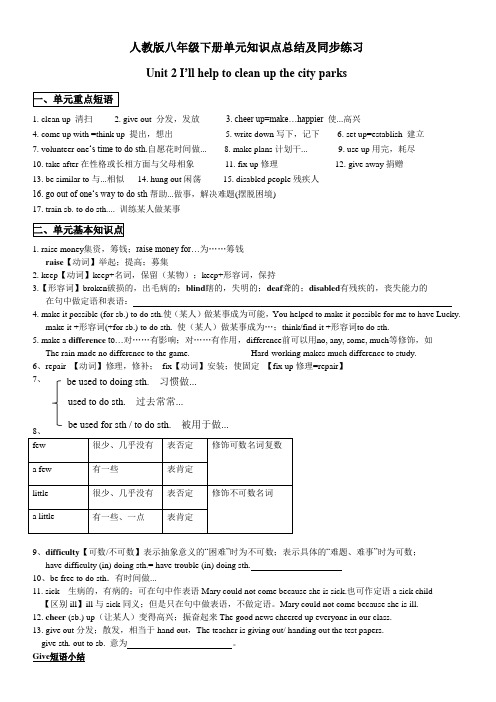
人教版八年级下册单元知识点总结及同步练习Unit 2 I’ll help to clean up the city parks1. clean up 清扫2. give out 分发,发放3. cheer up=make…happier 使...高兴4. come up with =think up 提出,想出5. write down写下,记下6. set up=establish 建立7. volunteer one‘s time to do sth.自愿花时间做... 8. make plans计划干... 9. use up用完,耗尽10. take after在性格或长相方面与父母相象11. fix up修理12. give away捐赠13. be similar to与...相似14. hung out闲荡15. disabled people残疾人16. go out of one‘s way to do sth帮助...做事,解决难题(摆脱困境)17. train sb. to do sth.... 训练某人做某事1. raise money集资,筹钱;raise money for…为……筹钱raise【动词】举起;提高;募集2. keep【动词】keep+名词,保留(某物);keep+形容词,保持3.【形容词】broken破损的,出毛病的;blind瞎的,失明的;deaf聋的;disabled有残疾的,丧失能力的在句中做定语和表语:4. make it possible (for sb.) to do sth.使(某人)做某事成为可能,You helped to make it possible for me to have Lucky.make it +形容词(+for sb.) to do sth. 使(某人)做某事成为…;think/find it +形容词to do sth.5. make a difference to…对……有影响;对……有作用,difference前可以用no, any, some, much等修饰,如The rain made no difference to the game. Hard-working makes much difference to study.修理=repair】9、difficulty【可数/不可数】表示抽象意义的“困难”时为不可数;表示具体的“难题、难事”时为可数;have difficulty (in) doing sth.= have trouble (in) doing sth.10、be free to do sth.有时间做...11. sick 生病的,有病的;可在句中作表语Mary could not come because she is sick.也可作定语a sick child【区别ill】ill与sick同义;但是只在句中做表语,不做定语。

I'll help to clean up the city parksⅠ. Fill in the blanks according to the given tips, using their proper form.1. I felt l_____ because my classmates all went on a school trip.2. Something is wrong with his eyes. The poor b_____ man can see nothing.3.Can’t you see the “No smoking” s_____?4. The box is too heavy. Could you please help me c_____ it?5.—How much money will the j_____ cost you?— About 3,000 yuan.6. He smiled in _____(satisfied) when he won the game.7.We can’t put off _____(make) a plan.8. The _____(own) of the shop was cleaning the floor when I walked in.9.I got the _____(feel) that he didn’t like me.10. On my way to school, I noticed some _____(break) chairs on the right side of the road.Ⅱ. Complete the following sentences.1.野餐过后你一定要收拾干净。
You should always _____ _____ after a picnic.2.当他们听到这个好消息时,他们都欢呼了起来。

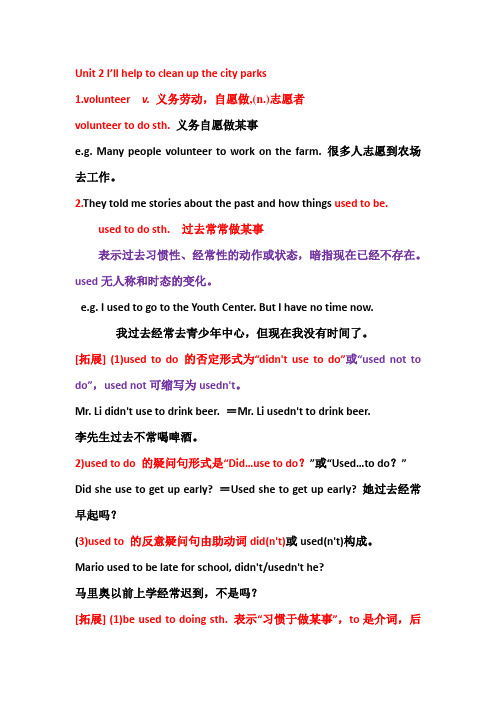
Unit 2 I’ll help to clean up the city parks1.volunteer v.义务劳动,自愿做,(n.)志愿者volunteer to do sth. 义务自愿做某事e.g. Many people volunteer to work on the farm.很多人志愿到农场去工作。
2.They told me stories about the past and how things used to be.used to do sth. 过去常常做某事表示过去习惯性、经常性的动作或状态,暗指现在已经不存在。
used无人称和时态的变化。
e.g. I used to go to the Youth Center. But I have no time now.我过去经常去青少年中心,但现在我没有时间了。
[拓展] (1)used to do 的否定形式为“didn't use to do”或“used not to do”,used not可缩写为usedn't。
Mr. Li didn't use to drink beer. =Mr. Li usedn't to drink beer.李先生过去不常喝啤酒。
2)used to do 的疑问句形式是“Did…use to do?”或“Used…to do?” Did she use to get up early? =Used she to get up early? 她过去经常早起吗?(3)used to 的反意疑问句由助动词did(n't)或used(n't)构成。
Mario used to be late for school, didn't/usedn't he?马里奥以前上学经常迟到,不是吗?[拓展] (1)be used to doing sth. 表示“习惯于做某事”,to是介词,后跟名词、代词或动名词作宾语。
